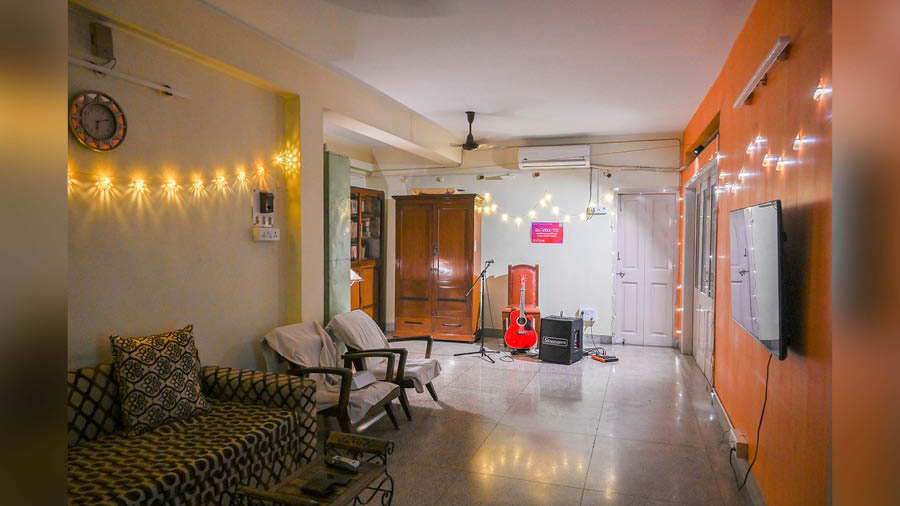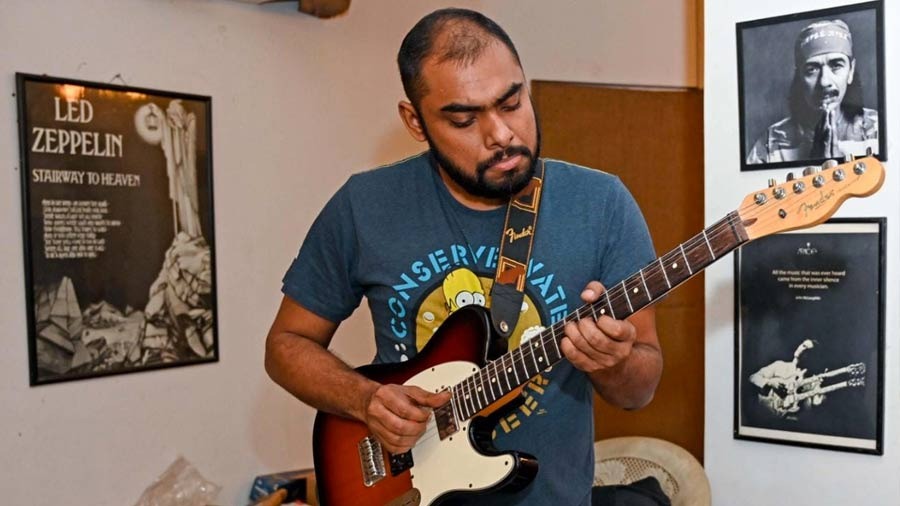A traditional Bengali household in Beleghata has turned into a live music venue. Adorned by fairy lights, and aesthetically alluring with wooden bookshelves carrying the weight of literary greats, the living room of Rubesh Sircar is a vibe, as today’s youth would say.
It is the headquarters of Boshow, a website (www.boshow.in) designed to help independent musicians. Boshow means ‘sit down’ in Bengali, and Sircar wanted to create a baithak where the spotlight would be on the artiste.
You can pick a venue, list it on the platform for tickets and play a full-length paid gig. “It could also be your terrace,” Sircar, 35, tells My Kolkata.
Sircar’s house is one of the venues on offer, besides a tie-up with various cafes and clubs in the city where the scale of the concerts can get bigger. Boshow, which started operations in 2021, is also a ticketing partner for other stakeholders in the music fraternity.
There is a marginal cut for offering the service, and the bulk of the amount stays with the artiste. “I usually charge only 5 per cent, and I ask for 10 per cent if someone asks me to curate the gig,” he adds.
Why Boshow?
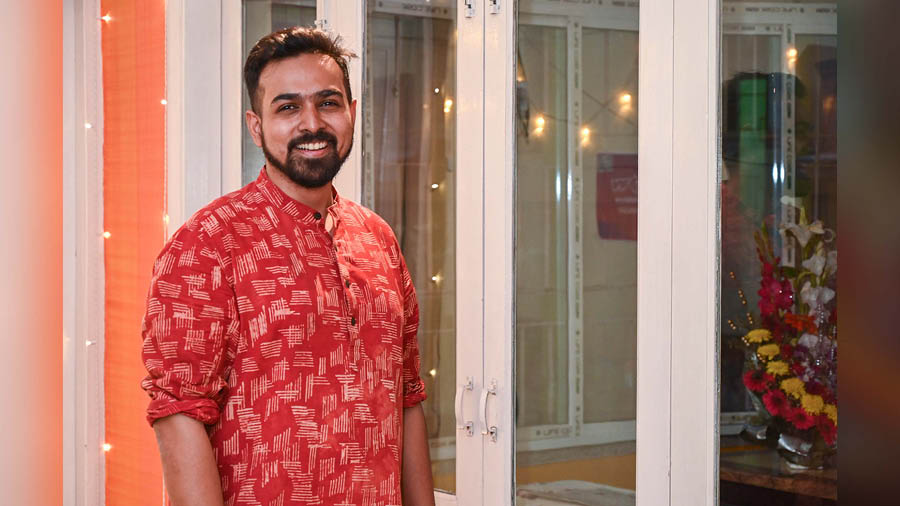
‘Boshow is an opportunity to employ independent musicians who want to express individuality,’ says Rubesh Sircar Amit Datta
Sircar, a singer-songwriter, felt the need for an organised economy in the independent music space after sensing why bands fall apart. “There were many original music bands during my college days, but they could not sustain themselves as there was no economy to keep their music alive. Boshow is an opportunity to employ independent musicians who want to express individuality.
“When a musician performs at a cafe or pub, he is not the subject. Drinks and food are. But when I saw people singing songs at my house party, I decided to turn this into a proper concert. People sing along and even request songs at such intimate parties,” reasons Sircar, resting on the sofa at one end of the room overlooking the stage area. “I bought these sofas so that senior citizens can come and watch a show comfortably.”
His home venue has microphones, along with a mixer and an amplifier. The smoking zone in the attached balcony is a hotbed of musical discussions, while the other room leads to Sircar’s workstation.
How it happened
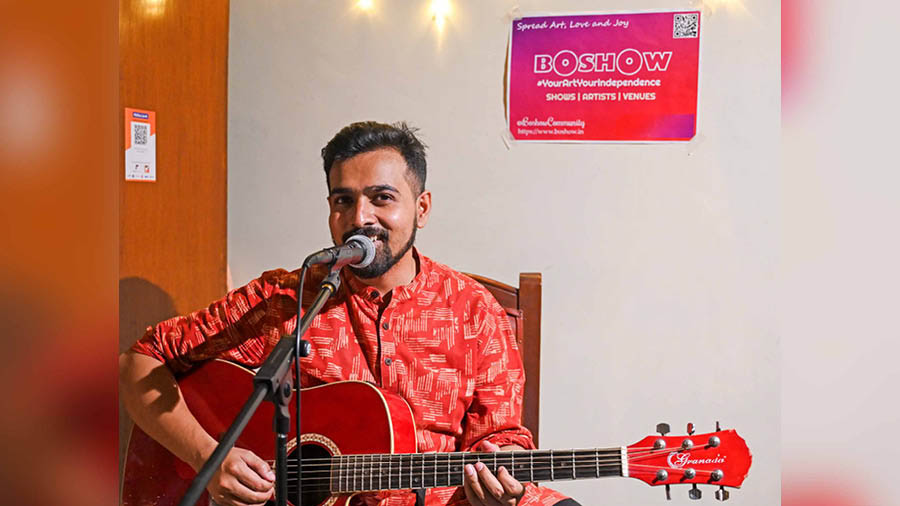
Sircar primarily earns from venue bookings and ticket sales from the website. He is not looking at an immediate profit Amit Datta
Being a computer engineering graduate from Techno India, Sircar had the skills to develop a website. He also provided software solutions while working with Accenture before shifting focus to his 75-year-old family business of stationery goods on College Street.
“And I was good at mathematics as a kid, so I understood numbers,” he says with a chuckle. “I got the confidence to design a website after my coding stint. And then, a friend of my father once asked me to make software for his restaurant business. All these experiences helped.”
Sircar primarily earns from venue bookings and ticket sales from the website. He is not looking at an immediate profit. “No startups make profits in their first financial year. I charge Rs 999 for my venue, and people have been hiring. Sovvota of Bangladesh recently did a show here. And there are gigs in cafes. We are doing 10 to 15 gigs a month, and we have done more than 100 gigs already," he adds.
Guest experience
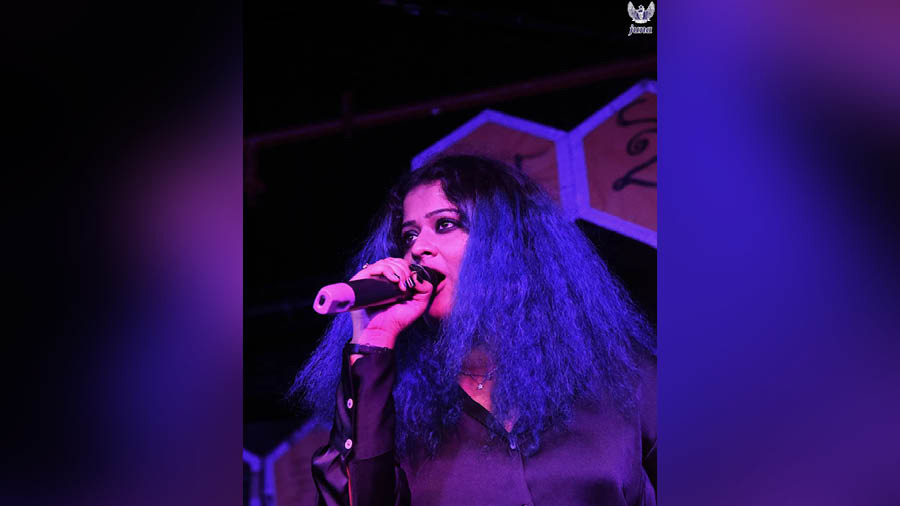
‘Boshow concerts have a lot of heart. I got to know many people who love my work since they repeatedly bought tickets to hear me sing,’ says singer-songwriter Shrestha Das Instagram
Singer-songwriter Shrestha Das, the vocalist of Rock and Roll outfit Palindrome, played a few Boshow gigs and rediscovered her love for original music. “I did my first solo/duo concert where I performed my originals. And that was a ticketed show and was sold out. It gave me a huge boost, and I started to think about a duo set more regularly where I could do my songs. Boshow concerts have a lot of heart. I got to know people who love my work since they repeatedly bought tickets to hear me sing,” she says.
Sircar dedicated the website to an individual whom he used to call Bhutto Kaku, a singer-songwriter from the yesteryears who couldn’t make it big due to a lack of a system in the independent space. “He was my father’s friend — who introduced me to music,” Sircar concludes. He hopes to make a difference and stop original music-makers from fading into oblivion.
